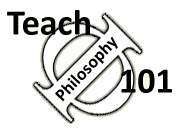Teach Philosophy 101
Free resources for
philosophy teachers!
"One of the most comprehensive, well-researched, and accessible guides for teachers that I have ever seen." James Lang, Chronicle of Higher Education (read full review of TΦ101)
Nontraditional Students
Many of the issues discussed in this section of TΦ101 are most appropriate for so called “traditional-aged” students, who are entering college right out of high school, hoping to move through college in four years. Of course, more and college students are “nontraditional” students, which is used to describe students who have at least one of the following characteristics: older than 25, attending school part-time, working full-time, have dependents, are financially independent, delayed college by at least a year, or are a veteran. There are estimates that over 40% of undergraduates are 25 or older, often called "adult learners" in the literature. And nearly three-quarters are nontraditional in the broader sense.
Of course, nontraditional students benefit from the pedagogical techniques that all learners do. But nontraditional students can face some specific challenges. David Scobey, Director of Bringing Theory to Practice, highlights three common experiences among nontraditional students in his article, "College Makes Me Feel Dangerous: On WellBeing and Nontraditional Students:"
-
Nontraditional students inhabit many different social roles which bring a kind of social complexity that differs from the traditional student. The competing obligations can make it difficult to succeed in structure designed for full-time, traditionally aged students.
-
This social complexity can lead to emotional complexity. Nontraditional students can easily feel out of place, recognizing that they are not following the normative path of college immediately following high school.
-
Nontraditional students are marginalized in their pursuit of education- from class schedules to financial aid, traditional structures of higher ed can work against nontraditional students sense of belonging as well as providing logistical hurdles to success.
Vanderbilt has a helpful guide focusing on adult learners called Teaching Adult Undergraduate Students. There are a number of conceptual frameworks that have been developed on adult learning; the most well-known of these are Malcolm Knowles' andragogy and Jack Mezirow's transformational learning.
Resources:
Davis, Barbara Gross, Tools for Teaching. San Francisco: Jossey-Bass, 2009, section 7 (85). As usual Davis has a wise perspective, also based in the research.
Erisman, Wendy and Steele, Patricia, Adult College Completion in the 21st Century: What We Know and What We Don't (June 18, 2015). Available at SSRN: https://ssrn.com/abstract=2622629 or http://dx.doi.org/10.2139/ssrn.2622629.
Knowles, Malcolm S. 1980. The Modern Practice of Adult Education: From Pedagogy to Andragogy. 2nd ed. New York: Cambridge Books.
MacDonald, Kris. "A Review of the Literature: The Needs of Nontraditional Students in Postsecondary Education," Strategic Enrollment Management Quarterly, January 2018. https://onlinelibrary.wiley.com/doi/full/10.1002/sem3.20115
Mezirow, Jack D., and Associates. 2000. Learning as Transformation: Critical Perspectives on a Theory in Progress. San Francisco: Jossey-Bass.
Scobey, David. "College Makes Me Feel Dangerous: On WellBeing and Nontraditional Students." In Harward, Donald W., ed. Well-Being and Higher Education: A Strategy for Change and the Realization of Education's Greater Purposes. Washington, DC, USA: Bringing Theory to Practice, 2016.
Author: Emily Esch
